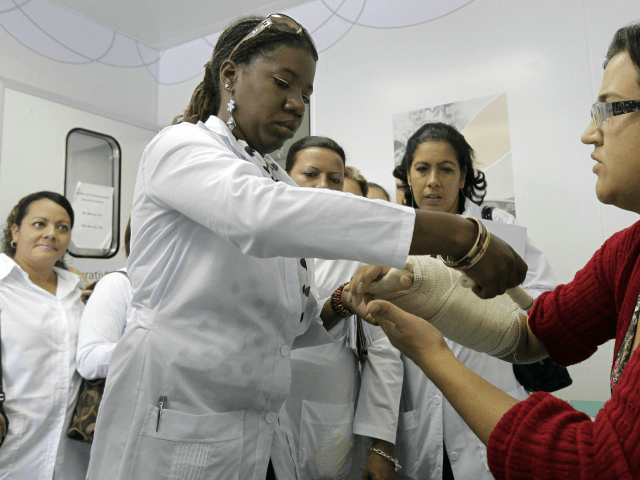Members of the Patriotic Union of Cuba (UNPACU), one of the island’s largest pro-democracy dissident groups, applauded the introduction of a bill by Senators Bob Menendez (D-NJ) and Marco Rubio (R-FL) Thursday condemning the Castro regime for “state-sponsored human trafficking” of doctors.
The Cuban Communist Party made as much as $11.5 million on its doctor slave trade in 2016. Havana suppresses the wages of doctors in Cuba to entice them to join international programs. Once the doctors agree, they are sent around the world to friendly regimes who agree not to pay the salaries to the doctors, but directly to the regime. The doctors receive a “living stipend” for food and lodging, but many say the amount is not enough to sustain themselves in their adoptive countries. The government also threatens doctors seeking to defect, stay in their mission countries, or bring their families to visit them with prison time once they return to Cuba.
Doctors who defect are banned from Cuba for at least eight years.
Menendez and Rubio debuted the resolution on Thursday, citing both State Department reporting on human trafficking reporting and an original report from the Spain-based Diario de Cuba newspaper that exposed the fact that the government of Brazil and the Pan-American Health Organization (PAHO) were both aware Cuba would not pay its doctors for work in Brazil when they agreed to launch a relief program known as Mais Médicos (“more doctors”).
The Cuban regime claimed in response to the criticism of Mais Médicos that the doctors were working in Brazil under a “scholarship” program, which explains why they were not getting paid. According to Diario de Cuba, citing Brazilian diplomatic cables, Cuba never mentioned the existence of a “scholarship” program during negotiations with Brazil and PAHO, which intervened to ensure that Brazil would not face consequences for violating sanctions against Cuba through the deal. Instead, all three acknowledged that the Brazilian and PAHO payments were “salaries” meant for the doctors but paid to the Communist Party directly.
“The Government of Cuba directly profits from exporting the services of Cuban professionals, having earned more than $8,000,000,000 from their work in 2016, of which foreign medical missions represent the majority of the income,” the resolution states. In Brazil, “the Government of Cuba … would retain approximately 75 percent of the monthly payment received from the Pan American Health Organization” while imposing travel restrictions on the doctors.
The bill also affirms that Cuba took coercive measures against the doctors such as “withholding their passports [and] restricting their movement,” preventing them from seeing their families, and “using ‘minders’ to monitor participants outside of work.”
“The Government of Cuba’s foreign medical missions constitute human trafficking,” the resolution affirms, demanding Cuba reimburse doctors in Brazil the payments they never received, as that number is now publicly known.
UNPACU, whose members advocate for a peaceful transition from communist authoritarianism to representative democracy, applauded the two senators for pressing the issue, comparing the doctor slave trade to sex slavery.
“As in the case of forced prostitution, professionals were being retained their passports after passing customs, impeded from legalizing their university degrees and experience, prohibited of speaking with ‘native’ population, denied social or sentimental relationships, or kept crowded living in degrading conditions, and forced away from their families, threatened every day,” UNPACU asserts.
“Cuban doctors earned 10.5% of the total of 4,276.25 dollars a month Brazil paid for them, 450 dollars in hand (400 them and 50 their family), and another 550 dollars that Cuba held for 3 years until they had to return to Cuba, tying with one more variable the return of its slave labor,” the UNPACU statement notes. “One who ‘performs actions tending to leave’ the island [faces] sentences of 3 years in jail or, if he ruins any material good in the attempt he has a sentence of 8 years in prison.”
The Brazilian deal made headlines in late 2018 with the election of conservative President Jair Bolsonaro, who has promised to use his leverage running South America’s largest country to defeat the socialist regime in Venezuela and its master in Cuba. Bolsonaro announced before his inauguration that, upon taking office, he would require Cuba to accept that Brazil pay its doctors directly and end a ban of families visiting the doctors in the country. The Castro regime responded by ordering the full withdrawal of all medical staff from Cuba and calling Bolsonaro “contemptuous and threatening.”
Bolsonaro has offered political asylum to any Cuban doctor who wishes to remain in Brazil, which hundreds are believed to have accepted. Accepting the deal bans the Cubans from returning home for at least eight years, separating them from their families.
The Cuban government site Cubadebate responded to the bipartisan Senate bill by accusing the United States of “brain theft” and “illegal” activities to harm the regime.
The bill, it claimed, “attempts to reestablish a brain drain program directed at Cuban doctors working abroad.”

COMMENTS
Please let us know if you're having issues with commenting.